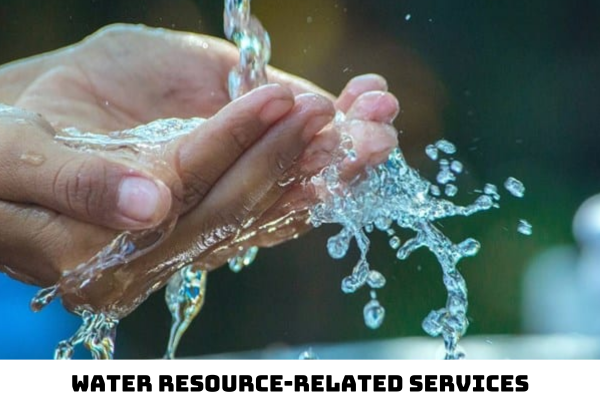Vietnam: What are the water resource-related services? What are the conditions for providing water resource-related services?
- What are the water resource-related services in Vietnam? What are the conditions for providing water resource-related services?
- What are the latest State policies on water resources in Vietnam?
- What are the 10 prohibited acts related to water resources in Vietnam under the Law on Water Resources 2023?
What are the water resource-related services in Vietnam? What are the conditions for providing water resource-related services?
Under the provisions of Article 70 of the Law on Water Resources 2023, water resource-related services in Vietnam include:
- Water resource regulation and distribution decision support services;
- Reservoir and inter-reservoir operation decision support services.
An organization shall satisfy the following conditions to provide water resource-related services:
- Possess the establishment decision from a competent authority or enterprise registration certificate or equivalent document by regulations of law on enterprises;
- Possess technical infrastructure, facilities, equipment and software for provision of services;
- Possess personnel whose expertise is appropriate to provide water resource regulation and distribution decision support services and reservoir and inter-reservoir operation decision support services.

What are the latest State policies on water resources in Vietnam?
Based on the provisions of Article 4 of the Law on Water Resources 2023, the latest State policies on water resources in Vietnam include:
- Modernize and professionalize the management of water resources in the direction of managing national water resources on the digital platform through the national water resources information system and database, and system of decision support tools, ensuring the efficient use of resources for water resources management.
- Prioritize the investment in the prospecting, exploration and exploitation of water sources, water retention and restoration of deteriorated, depleted or polluted water sources; offer incentives for water exploitation projects aiming to supply domestic and production water to inhabitants in areas facing freshwater scarcity, ethnic minority areas, mountainous areas, border areas, on islands, disadvantaged areas, extremely disadvantaged areas; enable the poor, women, children, persons with disabilities and other vulnerable persons to have access to domestic water.
- Prioritize the investment in the creation of water resources monitoring and surveillance network, national water resources information system and database, and enhancement of the capacity for forecasting water resources, floods, inundations, droughts, saltwater intrusion, sea level rise and other damage caused by water.
- Encourage, incentivize, and assist organizations and individuals to participate in conducting baseline survey of water resources; protect and develop water sources and water generation sources; store water and restore deteriorated, depleted, and polluted water sources; regulate and distribute water resources; prevent, respond to and recover damage caused by water.
– Encourage organizations and individuals to develop and apply standards, research, transfer and apply advanced science and technology to manage, protect, restore and develop water resources; exploit and use water economically and effectively, circularly use water, reuse water; convert seawater into freshwater; collect and use rainwater, artificially recharge groundwater; restore deteriorated, depleted and polluted water sources; prevent, respond to and recover damage caused by water.
- Expand and strengthen international integration and cooperation in water resources.
What are the 10 prohibited acts related to water resources in Vietnam under the Law on Water Resources 2023?
Under the provisions of Article 8 of the Law on Water Resources 2023, 10 acts related to water resources are strictly prohibited as follows:
- Dumping wastes and garbage, dumping or leaking hazardous substances or discharging hazardous emissions into water sources.
- Discharging wastewater into groundwater sources; discharging wastewater that has yet to be treated in accordance with environmental technical regulation on wastewater into surface water sources and seawater.
- Discharging wastewater and introducing wastes into domestic water safeguard zones.
- Illegally exploring, exploiting and using water resources, practicing groundwater drilling.
- Encroaching on rivers, streams, canals or ditches or carrying out river, stream, ditch or channel reclamation, unless otherwise prescribed by law; placing obstructions or obstacles, building architectures or planting trees, thus hindering flood drainage and water flow of rivers, streams, reservoirs, canals or ditches but taking no remedial measures.
- Illegally exploiting sand, gravel, sludge, soil and other types of minerals in rivers, streams, canals, ditches or lakes within water source protection corridors; carrying out drilling or digging operations, building houses, architectural objects or conducting within water source protection corridors, thereby resulting in river, stream, canal, ditch or lake bank erosion.
- Destroying facilities intended for protection, regulation or storage of water, exploitation, use, monitoring and surveillance of water resources, facilities intended prevention of, response to and recovery from damage caused by water.
- Falsifying information and data on water resources.
- Failing to comply with procedures for operating reservoirs and inter-reservoirs promulgated by competent authorities.
- Building dams, reservoirs or facilities for water regulation or storage or water source development in contravention of water resource-related planning, provincial planning and other relevant planning.
The Law on Water Resources 2023 will take effect from July 1, 2024, except for Clauses 3 and 4, Article 85 of the Law on Water Resources 2023.
LawNet